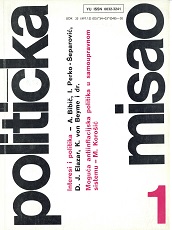Interesi i moć: sadržaj rada općinskih skupština u SR Hrvatskoj
Interests and Power: The Agenda of Communal Assemblies in SR Croatia
Author(s): Ivan GrdešićSubject(s): Politics, Constitutional Law, Political Sciences, Public Administration
Published by: Fakultet političkih znanosti u Zagrebu
Keywords: Interests; Power; Agenda; Communal Assemblies; SR Croatia;
Summary/Abstract: The agenda of the meetings of communal assemblies in SR Croatia have been used as an indicator of political power, or as the measure of the degree to which particular needs and interests, or suggested alternative solutions, have been reflected in the work of these political-representative bodies. The scrutiny of the composition of the agenda of a political body provides information on the interest pattern of that society. The agenda of communal assemblies were analyzed with regard to: content, interest orientation of the decisions, the decision-making agency, and the level of the economic development of the commune. The findings reveal that a substantial portion of the activities of the communal assembly (25%) concerns decisions related to the constitution and financing of the system. The prevalence of decisions relating to the commune itself (74%) indicates that the assembly still functions mainly as an organ of authority and as a part of the state administrative system. The interest of the delegations! base do not figure on the list of the assembly’s priorities, as is required by the constitutional concept. The equal competences of the assembly chambers in all decision-making is evident in all agenda; insufficient specialisation and selectivity practically reduce the assembly to a one-chamber body. The proportion of various types of questions figuring on the agenda of communes in economically developed and underdeveloped regions is practically the same. The dominant influence of executive-administrative agencies, low level of initiative of the delegational base, the monotypic character of organisation, these seem to be the main reasons for this tendency in the work of assembly chambers, which departs from the principles of delegation.
Journal: Politička Misao
- Issue Year: XXIII/1986
- Issue No: 01
- Page Range: 108-120
- Page Count: 13
- Language: Croatian

